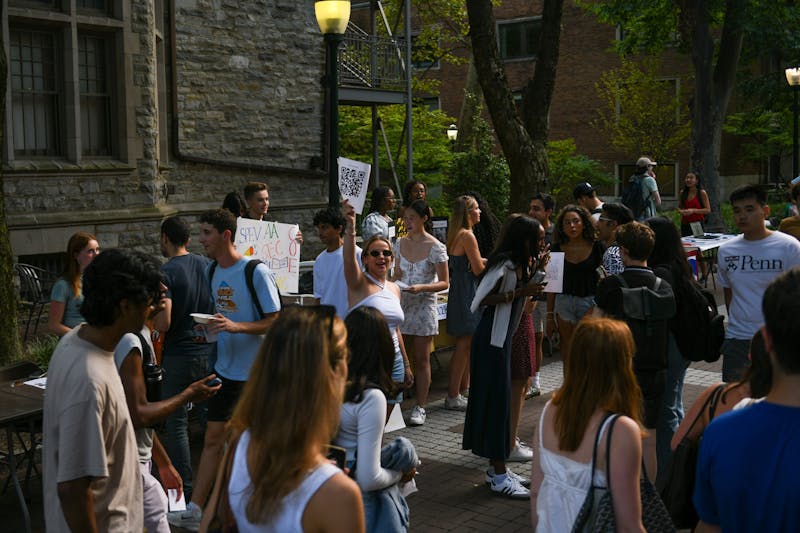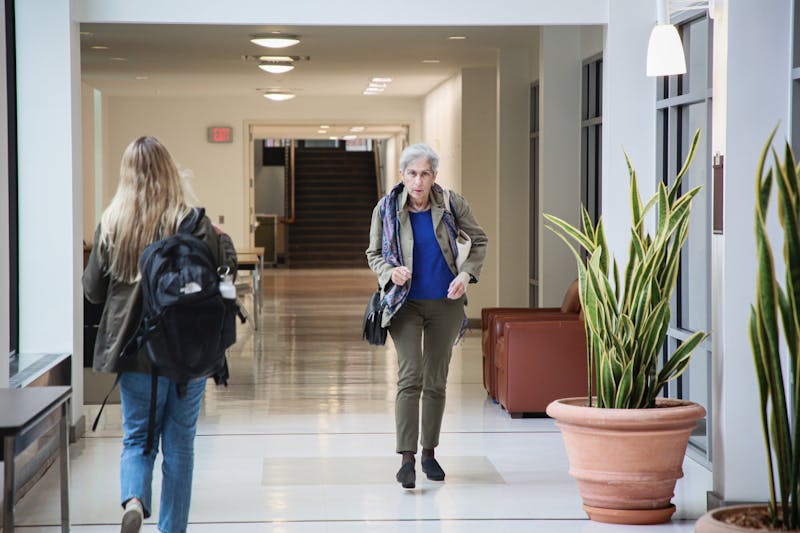
One might be surprised to hear that fraternity brothers were absolutely captivated by a lecture about the "Degas and the Dance" exhibit currently at the Philadelphia Museum of Art.
Standing at the back of a wood-paneled room with the curtains drawn and a slide-projector at his side, Joseph Rishel, curator of European Painting before 1900 at the Philadelphia Museum of Art, engaged his audience with witty commentary and exciting explanations of Degas' artwork.
"It made me wish I'd taken an art history class," College junior Andy Holt said. "It really was fascinating."
Brought to Delta Psi -- better known as St. A's -- yesterday afternoon by family friend and fraternity brother Billy Peelle, Rishel was this spring's lecturer in the Saint Anthony Hall Speakers Series.
The brothers invited approximately 50 professors and administrators to the event, a small handful of whom attended.
Rishel told the story of Degas' fascination with opera and dance, first providing background knowledge about 19th century French society in which public experiences had become a large part of life.
Explaining how Degas absorbed and related the "world of the opera" from innumerable angles to tell different stories, Rishel kept the crowd interested with a combination of small anecdotes and his own personal enthusiasm for the subject.
"I think it's a real corker," he said. "The intimacy, the toughness, the newness of this is so amazing."
Emphasizing that Degas depicted movement over time and caught dancers in all moods, Rishel stressed that the painter both existed and depicted "this middle sort of world... the tidewater between public and private."
Rishel spoke of Degas as having a "disconcerting power of observation," and as a man whose paintings were "hugely bold, very radical, and drove people crazy at the time."
Most awesome about Degas's artwork, Rishel suggested, is that he painted scenes of opera life from memory after the opera house he frequented burned down. "He invented a world of ballet that was realer than the real in a certain sense."
After references to French clubs that "I'm sure you know nothing about" and the occasional "yakkity-yak" in the middle of a long sentence, Rishel fielded questions from the fraternity brothers.
Delta Psi President Brooks Baskin said he enjoyed Rishel's presentation.
"It's good to get a different element than the usual fraternity stuff," Baskin said. "Art and culture versus fraternity life we usually think of as two extremes."
"Coming out [of the room], I heard someone say that they learned as much in 40 minutes as in three or four art history lectures," College junior Matt Vergare said, disappointed that more faculty did not join the brothers.
"The way he tells the whole story of dance [in] Paris during that period... I found very fascinating. It was different than any way I've ever heard before, from any professor," Peelle said.
Wharton freshman Saquib Mahmood said that he had seen the Degas show but did not understand it until Rishel's explanation, which "kind of opened my eyes."
"Someone as renowned as him coming here reflects well on what we have here," Mahmood said. "There's a lot more to this place than just parties."
The Daily Pennsylvanian is an independent, student-run newspaper. Please consider making a donation to support the coverage that shapes the University. Your generosity ensures a future of strong journalism at Penn.
DonatePlease note All comments are eligible for publication in The Daily Pennsylvanian.







